英语 people 和 person 的区别
人教版七年级下册英语Unit 9 单元知识梳理与练习

Is he tall or short?
He isn’t tall or short. He’s of medium height.
语法探究
Ⅰ.形容词的排列顺序
在英语中,当名词有多个形容词修饰时,就有它们的先后顺序。 下面的口诀可帮你记住这一先后顺序: 限定描绘大、长、高,形 状、年龄和新老;颜色、国籍跟材料,作用、类别往后靠。
1.中等身材 2.中等高度 3.少许牛奶 4.几乎没牛奶 5.有点胖 6.去看电影 7.圆脸 8.寻找 9.外貌 10.最后 11.在月末 12.彼此 13.首先
1.of medium build 2.of medium height 3.a little milk 4.little milk 5.a little heavy 6.go to the cinema(go to the movies) 7.a round face 8.look for 9.look like 10.in the end(at last) 11.at the end of the month 12.each other 13.first of all
33.教英语的方法
33.the way(s) of teaching English
34.那位有金黄色长发的妇女 34.that woman with long blond hair
35.一份真正有趣的工作
35.a really interesting job
36.画一张罪犯的画像
36.draw a picture of the criminal
根据所给汉字或首字母写出正确的英语单词,使句意完整:
1.He is wearing a pair of ___g_la_s_s_e_s_______(眼镜) on his nose. 2.I am sure your son will grow into a h_a_n_d_s_o_m__e_ (英俊的) young
名词
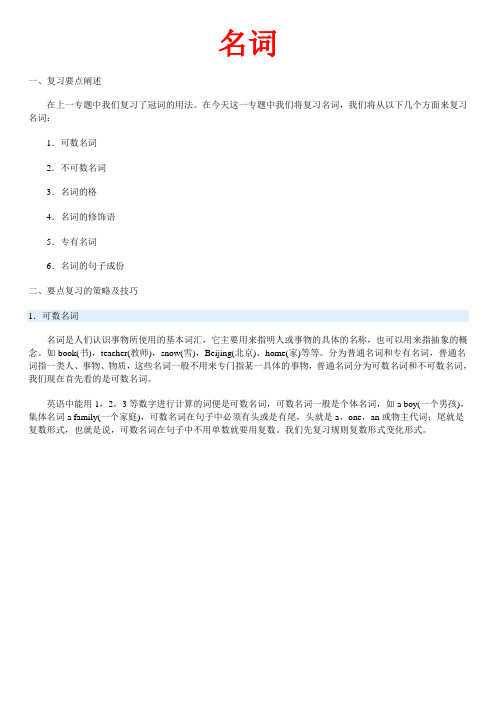
名词一、复习要点阐述在上一专题中我们复习了冠词的用法。
在今天这一专题中我们将复习名词,我们将从以下几个方面来复习名词:1.可数名词2.不可数名词3.名词的格4.名词的修饰语5.专有名词6.名词的句子成份二、要点复习的策略及技巧1.可数名词名词是人们认识事物所使用的基本词汇,它主要用来指明人或事物的具体的名称,也可以用来指抽象的概念。
如book(书),teacher(教师),snow(雪),Beijing(北京)、home(家)等等。
分为普通名词和专有名词,普通名词指一类人、事物、物质,这些名词一般不用来专门指某一具体的事物,普通名词分为可数名词和不可数名词,我们现在首先看的是可数名词。
英语中能用1,2,3等数字进行计算的词便是可数名词,可数名词一般是个体名词,如a boy(一个男孩),集体名词a family(一个家庭),可数名词在句子中必须有头或是有尾,头就是a,one,an或物主代词;尾就是复数形式,也就是说,可数名词在句子中不用单数就要用复数。
我们先复习规则复数形式变化形式。
特别提示:在遵循一般规则的同时,也有一些例外的情况:(1)以-f或-fe结尾直接加-s的名词常见的有:belief—beliefs信念chief—chiefs首领grief—griefs悲伤gulf—gulfs海湾proof—proofs证据roof—roofs屋顶handkerchief有两种复数形式:handkerchiefs和handkerchieves。
(2)以-o结尾的部分名词复数形式有两种,既可加-s也可加-es。
cargo—cargos/cargoes货物motto—mottos/mottoes箴言volcano—volcanos/volcanoes火山zero—zeros/zeroes零(3)以辅音字母加-y结尾的专有名词复数形式直接加-s。
如:Marys,Henrys等。
(4)有些字母用复数时需要加-‟s。
英语词类:名词及练习题
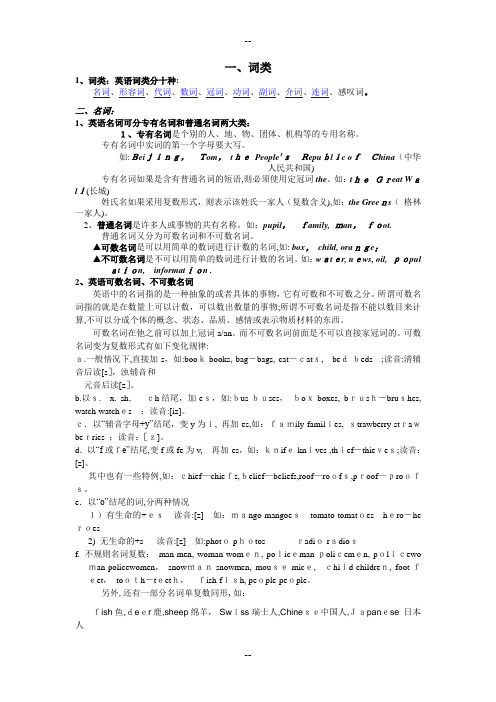
一、词类1、词类:英语词类分十种:名词、形容词、代词、数词、冠词、动词、副词、介词、连词、感叹词。
二、名词:1、英语名词可分专有名词和普通名词两大类:1、专有名词是个别的人、地、物、团体、机构等的专用名称。
专有名词中实词的第一个字母要大写。
如:Beijing,Tom,thePeople’sRepublic ofChina(中华人民共和国)专有名词如果是含有普通名词的短语,则必须使用定冠词the。
如:theGreat Wall(长城)姓氏名如果采用复数形式,则表示该姓氏一家人(复数含义),如:the Greens(格林一家人)。
2、普通名词是许多人或事物的共有名称。
如:pupil,family, man,foot.普通名词又分为可数名词和不可数名词。
▲可数名词是可以用简单的数词进行计数的名词,如: box,child, orange;▲不可数名词是不可以用简单的数词进行计数的名词。
如:water, news, oil, popul ation,information .2、英语可数名词、不可数名词英语中的名词指的是一种抽象的或者具体的事物,它有可数和不可数之分。
所谓可数名词指的就是在数量上可以计数,可以数出数量的事物;所谓不可数名词是指不能以数目来计算,不可以分成个体的概念、状态、品质、感情或表示物质材料的东西。
可数名词在他之前可以加上冠词a/an。
而不可数名词前面是不可以直接家冠词的。
可数名词变为复数形式有如下变化规律:a.一般情况下,直接加-s,如:book-books, bag-bags, cat-cats,bed-beds;读音:清辅音后读[s],浊辅音和元音后读[z]。
b.以s.x. sh.ch结尾,加-es,如:bus-buses,box-boxes, brush-brushes, watch-watches;读音:[iz]。
c.以“辅音字母+y”结尾,变y为i, 再加-es,如:family-families, strawberry-strawberries ;读音:[z]。
英语中名词people的单数与复数问题
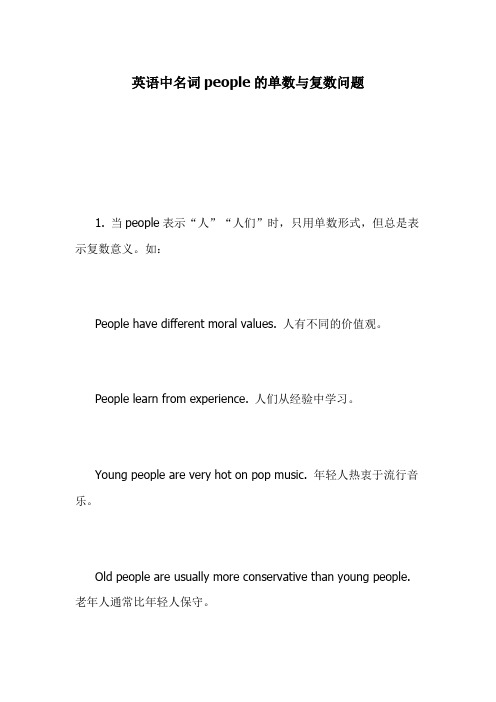
英语中名词people的单数与复数问题
1. 当people表示“人”“人们”时,只用单数形式,但总是表示复数意义。
如:
People have different moral values. 人有不同的价值观。
People learn from experience. 人们从经验中学习。
Young people are very hot on pop music. 年轻人热衷于流行音乐。
Old people are usually more conservative than young people. 老年人通常比年轻人保守。
表示“一个人”时,不能用one people,可根据情况改用one person, one man, one woman, one boy等。
2. people表示“民族”时是可数名词,其前可用不定冠词,也可复数形式。
We Chinese are a hardworking people. 我们中国人是勤劳的人民。
Ireland was inhabited by two peoples. 爱尔兰居住着两个民族。
比较:
How many peoples live in Asia? 亚洲有多少个民族?
How many people live in the room? 这房间住了多少人?
有时它还可与few, many等连用。
如:
Few peoples in the world can boast (of) such an old civilization as ours. 世界上没有几个民族有像我国民族这样悠久的文化。
代表一生经历的英语
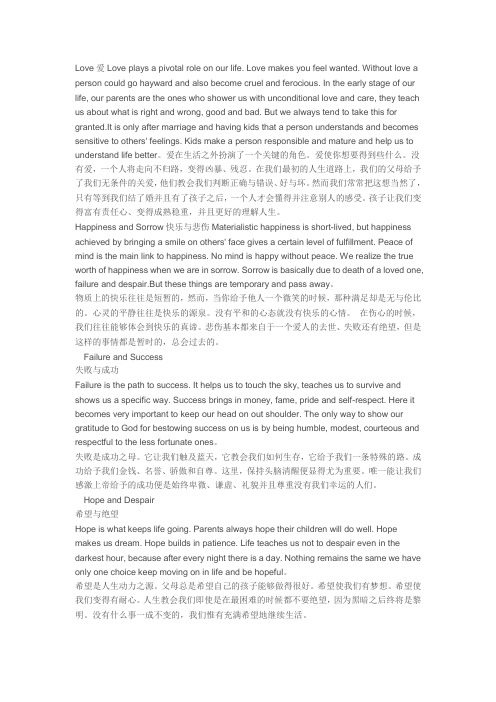
Love爱Love plays a pivotal role on our life. Love makes you feel wanted. Without love a person could go hayward and also become cruel and ferocious. In the early stage of our life, our parents are the ones who shower us with unconditional love and care, the y teach us about what is right and wrong, good and bad. But we always tend to take this for granted.It is only after marriage and having kids that a person understands and becomes sensitive to others' feelings. Kids make a person responsible and mature and help us to understand life better。
爱在生活之外扮演了一个关键的角色。
爱使你想要得到些什么。
没有爱,一个人将走向不归路,变得凶暴、残忍。
在我们最初的人生道路上,我们的父母给予了我们无条件的关爱,他们教会我们判断正确与错误、好与坏。
然而我们常常把这想当然了,只有等到我们结了婚并且有了孩子之后,一个人才会懂得并注意别人的感受。
孩子让我们变得富有责任心、变得成熟稳重,并且更好的理解人生。
Happiness and Sorrow快乐与悲伤Materialistic happiness is short-lived, but happiness achieved by bringing a smile on others' face gives a certain level of fulfillment. Peace of mind is the main link to happiness. No mind is happy without peace. We realize the true worth of happiness when we are in sorrow. Sorrow is basically due to death of a loved one, failure and despair.But these things are temporary and pass away。
2015-2016学年牛津沪教版初中英语七年级下同步课堂笔记Unit_1_People_around_us
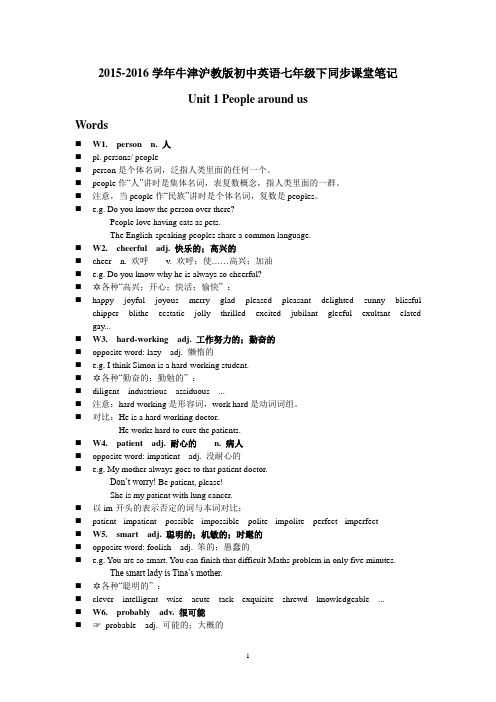
2015-2016学年牛津沪教版初中英语七年级下同步课堂笔记Unit 1 People around usWords⏹W1. person n. 人⏹pl. persons/ people⏹person是个体名词,泛指人类里面的任何一个。
⏹people作“人”讲时是集体名词,表复数概念,指人类里面的一群。
⏹注意,当people作“民族”讲时是个体名词,复数是peoples。
⏹ e.g. Do you know the person over there?People love having cats as pets.The English-speaking peoples share a common language.⏹W2. cheerful adj. 快乐的;高兴的⏹cheer n. 欢呼v. 欢呼;使……高兴;加油⏹ e.g. Do you know why he is always so cheerful?⏹✲各种“高兴;开心;快活;愉快” :⏹happy joyful joyous merry glad pleased pleasant delighted sunny blissfulchipper blithe ecstatic jolly thrilled excited jubilant gleeful exultant elated gay...⏹W3. hard-working adj. 工作努力的;勤奋的⏹opposite word: lazy adj. 懒惰的⏹ e.g. I think Simon is a hard-working student.⏹✲各种“勤奋的;勤勉的” :⏹diligent industrious assiduous ...⏹注意:hard-working是形容词,work hard是动词词组。
⏹对比:He is a hard-working doctor.He works hard to cure the patients.⏹W4. patient adj. 耐心的n. 病人⏹opposite word: impatient adj. 没耐心的⏹ e.g. My mother always goes to that patient doctor.Don‟t worry! Be patient, please!She is my patient with lung cancer.⏹以im-开头的表示否定的词与本词对比:⏹patient - impatient possible - impossible polite - impolite perfect - imperfect⏹W5. smart adj. 聪明的;机敏的;时髦的⏹opposite word: foolish adj. 笨的;愚蠢的⏹ e.g. You are so smart. You can finish that difficult Maths problem in only five minutes.The smart lady is Tina‟s mother.⏹✲各种“聪明的” :⏹clever intelligent wise acute tack exquisite shrewd knowledgeable ...⏹W6. probably adv. 很可能⏹☞probable adj. 可能的;大概的⏹ e.g. You are probably right.It was probably her most popular song.⏹✲各种“很可能;或许;也许” :⏹maybe likely perhaps possibly ...⏹W7. forget v. 忘记⏹☞forget - forgetting forget - forgot - forgotten⏹opposite word: remember v. 记得⏹☃玩转forget:⏹forget后接人或事、物,表示“忘记某人/某事/某物”:⏹ e.g. He forgot the name of his primary school class teacher.⏹forget后接to do sth表示“忘记去做某事(还没做)”(forget to do sth):⏹ e.g. Don‟t forget to reply to Jane in the morning.⏹forget后接doing sth表示“忘记做过某事(做完了)”(forget doing sth):⏹ e.g. He forgot buying that scarf in Paris.⏹☃玩转remember:⏹remember后接人或事、物,表示“记得某人/某事/某物”:⏹ e.g. Mary remembered her middle school English teacher.⏹remember后接to do sth表示“记得去做某事(还没做)”⏹(remember to do sth):⏹ e.g. You should remember to reply to Jane in the morning.⏹remember后接doing sth表示“忘记做过某事(做完了)”⏹(remember doing sth):⏹ e.g. I remember seeing the man somewhere.⏹W8. smell n. 气味v. 闻;嗅⏹ e.g. Many people don‟t like the smell of durians.⏹☃玩转smell(作动词):⏹(1)smell作行为动词时,后面直接跟宾语:⏹ e.g. Smell the perfume. Do you like it?⏹(2)smell作系动词时,后接形容词来修饰主语:⏹ e.g. The meat smells nice, but tastes terrible.⏹✲各种系动词:⏹be [am, is, are](状态系动词);keep, rest, remain, stay, lie, stand(持续系动词);seem, appear,look(表象系动词);feel, sound, smell, taste(感官系动词);become, grow, turn, fall, get, go, come, run(变化系动词);prove, turn out(终止系动词)...⏹W9. care n. 照顾v. 关心;关注;在乎⏹ e.g. Baby dogs and cats need a lot of care.⏹The only thing he cares about is money.⏹☃玩转care:⏹careful adj. 仔细的;小心的careless adj. 粗心的;漫不经心的carefully adv. 仔细地;小心地carelessly adv. 粗心地;草率地carefulness n. 仔细;慎重carelessness n. 粗心大意;草率⏹✲各种care:⏹(1)care about sth 担心/在乎某事 e.g. She doesn‟t care about money.⏹(2)take care of sb 照顾某人 e.g. I‟ll take care of myself.⏹(3)care for sb 照顾某人(病人) e.g. She cared for her father in his dying year.⏹(4)care for sth 想要某物 e.g. Would you care for a drink?⏹(5)care to do sth 愿意做某事(用于礼貌性话语)= be willing to do sthe.g. Would you care to wait here, sir?⏹W10. miss v. 想念,怀念;错过;过失n. 小姐;女士(用于未婚的女性,放在姓之前,要大写)⏹ e.g. I miss my classmates in my primary school.⏹He missed the ball.⏹Are you Miss Huang?⏹W11. joke n. 玩笑v. 说笑话;开玩笑⏹ e.g. He is full of fun. He always tell jokes to make us laugh.⏹I didn‟t get the joke.⏹They are laughing and joking together.⏹☃玩转joke:⏹play a joke on sb 开某人玩笑have a joke 说笑话;开玩笑⏹Are you joking (me)? = Are you kidding (me)? 你在(和我)开玩笑吗?⏹W12. laugh v. 玩笑⏹☞laughter n. 笑;笑声⏹注意:laugh中的的gh发/ f /音。
2020年中考英语复习之重点核心词汇详解11:P字部(一)

2020年中考英语复习之重点核心词汇详解专题十一P字部(一)1. pardonn.原谅,宽恕,对不起v.原谅,宽恕用法:○1pardon作名词,常见搭配为ask/beg one’s pardon (for sth.)请求某人原谅(某事)。
例如:He asked her pardon for having cheated her. 他欺骗了她,向她请求原谅。
○2pardon作动词,常用于pardon sb. for doing sth.原谅某人(做)某事:He could never pardon her for the things she had said. 他永远不会原谅她说的话。
○3口语中常用pardon me表示一种礼貌用语,意为“对不起;劳驾”,或请求别人重复:Oh, pardon me, I didn’t mean to disturb you. 噢,对不起,我不是有意要打扰你。
○4口语中常常直接用Pardon?做语气词,表示“请再说一遍”(没听清,希望对方重复):‘Hurry up Jonathan!’‘Pardon?’‘I said hurry up!’“快点,乔纳森!”“你说什么啊?”“我说快点!”(2019,湖北卷,单项选择)35. —The game is too hard for me. I will certainly lose.—_______. You should never say no before you try.A. Forget it!B. Come on!C. I’m s orry.D. Pardon me?2. parkn.公园;v.停放(汽车等)关联词组:forest park森林公园;amusement park游乐园;city park城市公园熟词僻义:park还可作动词,表示“停放(汽车等)”,可接宾语,也可不接宾语:I couldn’t find anywhere to park. 我找不到地方停车。
“人”与“人”的不同用法
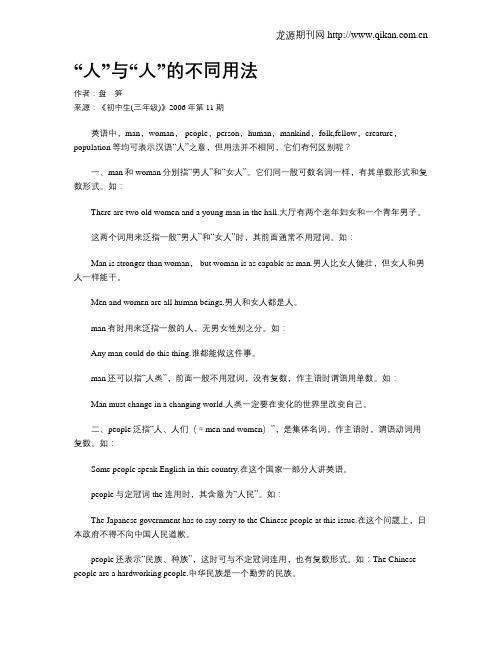
“人”与“人”的不同用法作者:盘笋来源:《初中生(三年级)》2006年第11期英语中,man,woman, people,person,human,mankind,folk,fellow,creature,population等均可表示汉语“人”之意,但用法并不相同,它们有何区别呢?一、man和woman分别指“男人”和“女人”。
它们同一般可数名词一样,有其单数形式和复数形式。
如:There are two old women and a young man in the hall.大厅有两个老年妇女和一个青年男子。
这两个词用来泛指一般“男人”和“女人”时,其前面通常不用冠词。
如:Man is stronger than woman, but woman is as capable as man.男人比女人健壮,但女人和男人一样能干。
Men and women are all human beings.男人和女人都是人。
man有时用来泛指一般的人,无男女性别之分。
如:Any man could do this thing.谁都能做这件事。
man还可以指“人类”,前面一般不用冠词,没有复数,作主语时谓语用单数。
如:Man must change in a changing world.人类一定要在变化的世界里改变自己。
二、people泛指“人、人们(=men and women)”,是集体名词,作主语时,谓语动词用复数。
如:Some people speak English in this country.在这个国家一部分人讲英语。
people与定冠词the连用时,其含意为“人民”。
如:The Japanese government has to say sorry to the Chinese people at this issue.在这个问题上,日本政府不得不向中国人民道歉。
people还表示“民族、种族”,这时可与不定冠词连用,也有复数形式。
语言学-同义词与反义词
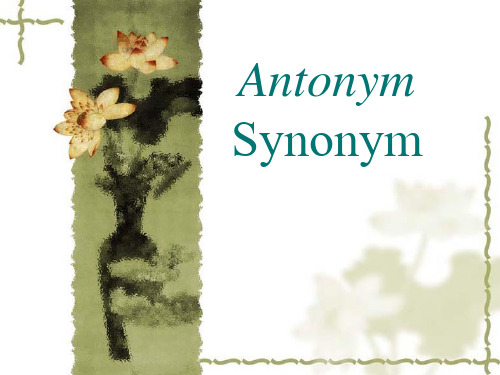
First, GRADABLE. That is, the members of a pair differ in terms of degree. 每对的成员在程度
这样一对反义词在语义的直线坐标上离开 中点距离应是相等的,但是可以有它们的 内项,也可能有它们的外项。 例如以hot(热的)和cold(冷的)这一对反义 词来看,它们可以有内项warm(温的)和 cool(凉的) 又如,以good(好的)和bad(坏的)这一对 反义词来看,它们可有外项excellent(极 好的)和terrible(极糟的)
2. 从色彩方面辨析
1)感情色彩不同 褒义 black---中性Negro----nigger贬义 Statesman--------------politician Slender------------------skinny 口语 tell----inform书面语 Answer---reply Go down---decline
(1)Gradable antonym 等级反义词
Features
of them :
上有区别。 (1)The denial of one is not necessarily the assertion of the other.对一方的否定并非是对另一方的肯定。 (2)can be modified by “very” (3) have comparative and superlative degrees (4) intermediate degrees may be lexicalized (sometimes)
反义词连用则是英国历代文学家喜欢的修辞手法---矛盾修辞法。下面这一 段引自狄更斯(Charles Dickens)所著的小说《双城记》(A Tale of Two Cities)
people的复数和用法例句

people的复数和用法例句泛指“人们时其前不加定冠词the。
people的用法2:people与定冠词the连用时,其含义为“人民(群众),指一个国家的或全世界的人民或者与统治阶级相对的“人民,没有复数形式。
people的用法3:people还可作“民族,种族“被共同文化联合在一起的集体解,是可数名词,“一个民族是a/one people,多个民族时用其复数形式peoples。
其前有a, one或every等词修饰时,谓语动词多用单数形式。
用it或itself指代, people在句中作主语时,谓语动词用单数或复数均可,但以用复数者居多。
people的用法4:在口语中,people常指“家人,亲属或“特别的场所、团体和职业的人们,在句中作主语时,谓语动词用复数形式。
people的用法5:在英式英语中, people是person的复数形式。
然而一些美国作家在这方面比较保守,在指一定数量,尤指较少数量的人时,喜欢用persons。
在英式英语中, persons只能用在关于法律的上下文中,或基督教徒所信仰的上帝的三位一体中。
people的用法6:people可与数词连用。
例如:There are ten people present.有10个人出席。
2. The study theorizes about the role of dreams in peoples' lives.这项研究从理论上说明了梦在人们生活中的作用。
3. Let's drink to the friendship of our two peoples.让我们为两国人民的友谊干杯.4. May the friendship between the peoples of ( our ) two countries last forever.祝两国人民的友谊万古长青.5. There are frequent contacts between the peoples of the two countries.两国人民之间交往频繁.6. The magazine becomes a cultural medium of intercourse between the twopeoples.该杂志成为两民族间文化交流的媒介.7. Some peoples are yellow races.有些民族是黄色人种.8. The friendship between the two peoples is everlasting.两国人民的友谊永存.9. Our Parliament has been a beacon of hope to the peoples of Europe.我们的国会一直是欧洲各族人民的希望之灯。
people的用法和短语例句
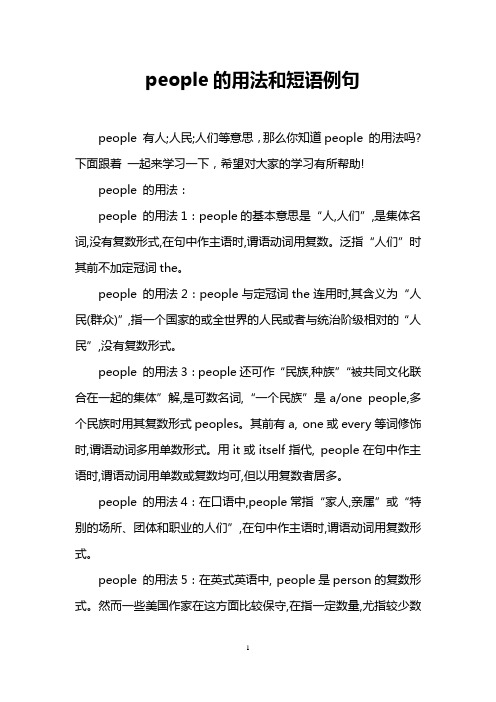
people的用法和短语例句people 有人;人民;人们等意思,那么你知道people 的用法吗?下面跟着一起来学习一下,希望对大家的学习有所帮助!people 的用法:people 的用法1:people的基本意思是“人,人们”,是集体名词,没有复数形式,在句中作主语时,谓语动词用复数。
泛指“人们”时其前不加定冠词the。
people 的用法2:people与定冠词the连用时,其含义为“人民(群众)”,指一个国家的或全世界的人民或者与统治阶级相对的“人民”,没有复数形式。
people 的用法3:people还可作“民族,种族”“被共同文化联合在一起的集体”解,是可数名词,“一个民族”是a/one people,多个民族时用其复数形式peoples。
其前有a, one或every等词修饰时,谓语动词多用单数形式。
用it或itself指代, people在句中作主语时,谓语动词用单数或复数均可,但以用复数者居多。
people 的用法4:在口语中,people常指“家人,亲属”或“特别的场所、团体和职业的人们”,在句中作主语时,谓语动词用复数形式。
people 的用法5:在英式英语中, people是person的复数形式。
然而一些美国作家在这方面比较保守,在指一定数量,尤指较少数量的人时,喜欢用persons。
在英式英语中, persons只能用在关于法律的上下文中,或基督教徒所信仰的上帝的三位一体中。
people 的用法6:people用作动词时意思是“使住着人,使有居民”。
people 的用法7:people还可表示“使…充满”,常与with连用,多用于文学语言中,且常用于被动结构。
people 的常用短语:用作名词(n.)of all people用作动词(v.)people with (v.+prep.)people 的用法例句:1. You can chat to other people who are online.你可以和其他在线的人聊天。
不规则复数形式

不规则复数形式有些可数名词的复数形式没有规则。
不规则复数形式主要有如下几种情况:特殊的复数形式英语中有很多名词的复数形式非常特殊,主要有如下几种情况:(1)集体名词:集体名词不能运用具体的数字修饰,下面的集体名词,不能用a,one,two等修饰,只能在其前加the表示“全体……”。
the police警察(指全体警察the English英国人(指全体英国人)the French法国人(指全体法国人) the Swiss瑞士人(指全体瑞士人)特别提示:“某国人”的表达法:a Chinese—two Chinese a Japanese—two Japanesean Australian—two Australians a Frenchman—two Frenchmen既可以说I’m Chinese.也可以说I’m a Chinese.可以说I’m English.或I’m an English boy.但不可以说I’m an English.在初中阶段我们所学的类似的词就是English和French.有些集体名词在改变表达方式后可以用具体数字修饰。
a policeman一位警察two policewomen两位女警察two English girls两个英国女孩two French boys两个法国男孩(2)复合名词a woman teacher—women teachers女教师an Englishman—Englishmen英国男子a grown-up—grown-ups成人a passer-by—passers-by过路人a brother-in-law—brothers-in-law内兄、内弟、小叔、大伯注意:man,woman作定语修饰复数时,需变为复数形式。
而girl,boy作定语修饰复数时则不变。
two men doctors两位男医生three girl students三名女学生(3)同时具有两种复数形式:有的名词当具有不同的含义时,其相应的复数形式也不相同。
people的复数和用法例句
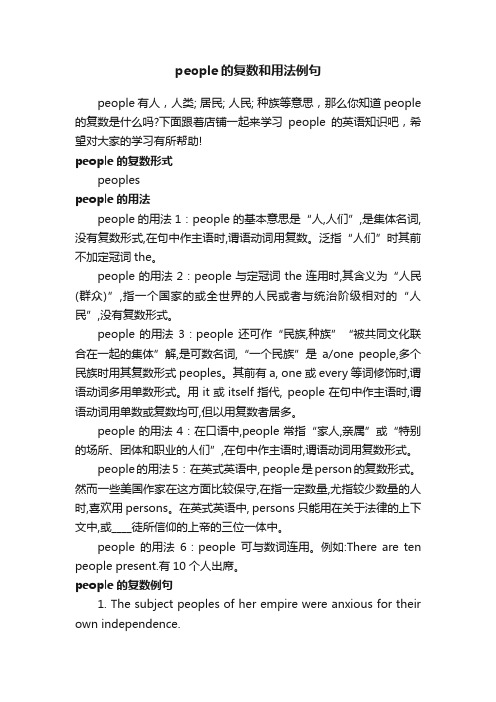
people的复数和用法例句people有人,人类; 居民; 人民; 种族等意思,那么你知道people 的复数是什么吗?下面跟着店铺一起来学习people的英语知识吧,希望对大家的学习有所帮助!people的复数形式peoplespeople的用法people的用法1:people的基本意思是“人,人们”,是集体名词,没有复数形式,在句中作主语时,谓语动词用复数。
泛指“人们”时其前不加定冠词the。
people的用法2:people与定冠词the连用时,其含义为“人民(群众)”,指一个国家的或全世界的人民或者与统治阶级相对的“人民”,没有复数形式。
people的用法3:people还可作“民族,种族”“被共同文化联合在一起的集体”解,是可数名词,“一个民族”是a/one people,多个民族时用其复数形式peoples。
其前有a, one或every等词修饰时,谓语动词多用单数形式。
用it或itself指代, people在句中作主语时,谓语动词用单数或复数均可,但以用复数者居多。
people的用法4:在口语中,people常指“家人,亲属”或“特别的场所、团体和职业的人们”,在句中作主语时,谓语动词用复数形式。
people的用法5:在英式英语中, people是person的复数形式。
然而一些美国作家在这方面比较保守,在指一定数量,尤指较少数量的人时,喜欢用persons。
在英式英语中, persons只能用在关于法律的上下文中,或____徒所信仰的上帝的三位一体中。
people的用法6:people可与数词连用。
例如:There are ten people present.有10个人出席。
people的复数例句1. The subject peoples of her empire were anxious for their own independence.她的帝国中被迫向她臣服的民族迫切渴望自身的独立。
英文person的汉语是什么意思

英文person的汉语是什么意思英文person的汉语是什么意思英文person是相对简单的一个单词,前提是我们要清楚它的汉语意思。
店铺为大家精心准备了英语单词person的几种汉语意思,欢迎大家前来阅读。
person的`汉语意思英 [ˈpɜ:sn] 美 [ˈpɜ:rsn]第三人称复数:people; persons名词人; (语法)人称; 身体; 容貌相关例句名词1. A strange person is asking to see you.有个陌生人想见你。
2. She was small and neat of person.她长得娇小玲珑。
3. He has no money on his person.他身边没有钱。
4. The young man has a fine person.那小帮子相貌堂堂。
5. He has a fine person.他容貌很好。
person的词典解释1. 人;个人A person is a man, woman, or child.e.g. At least one person died and several others were injured...至少一人死亡,还有几个人受伤。
e.g. Everyone knows he's the only person who can do the job...人人都知道他是唯一能做这项工作的人。
2. (person的复数形式,用于正式、法律、技术文体中)Persons is used as the plural of person in formal, legal, and technical writing.e.g. ...removal of the right of accused persons to remain silent...剥夺被告人保持沉默的权利e.g. Persons who wish to adopt a child may contact their local social services department.想收养孩子的人可以与当地社会公益部门联系。
一笑而过四级单词直接打印版

表示“往前”progress n./v.进步,进展[记]进步就是往前走。
profit n.利润v.得利[记]前面合适(fit)的东西,有钱赚。
professor n.教授[记]教授就是总是往前讲话的人。
[变]profession n.职业professional a.专业的n.专业人士promise n./v.承诺;希望[记]身体前倾说我会想(mise,形似miss)你的是承诺。
[变]promising a.有希望的,有前途的prove v.证明[记]证明就是往前说明。
[变]proof n.证明,证据(prove的名词,一般ve结尾的动词会衍变出以f结尾的名词。
比如:believe的名词为belief。
)pre-表示“在前,领先”precious a.珍贵的[记]以前(pre-)的东西一般比较珍贵。
predict vt.预测[记]预先[pre-)在发生之前说出结果叫预测。
prevent vt.预防;妨碍[记]预先(pre-)走(-vent,似went)掉是预防。
[例]Timely(及时的)repetition will prevent you from forgetting words.及时重复才能单词不忘。
preface n.前言[记]书翻开最前(pre)的那一面{ face}是前言。
preview n./v.预览;预习[记]pre-前面,view看,把书在前面看(view)叫预习。
[变]previous a.以前的view n.观察viewpoint n.观点per-表示“每个,都”percent a.百分之……的[记]每分(cent)钱都是百分之一元。
[变]percentage n.百分比person n.人[记]每(per)个儿子(son)都是人。
当然每个女儿也都是人,但是可没有perdaughter喔![辨]person和people的区别:person是可数的,可以说a person/two persons;但是people 是集合名词,只有复数,故不能说a people。
用person造句

用person造句人们在日常生活中经常会通过使用描述、定义、分类或者列举等方法来表达一个特定的意思或者表述一个观点,而此时,“person”这一单词可以成为非常有用的工具。
在英语中,person是一个表示“人”的单数形式,我们可以将其用在各种不同的语境中来传达各种不同的含义。
接下来,本文将会介绍一些关于用person造句的有趣和实用的例子。
一、人的描述1. Mary is a kind-hearted person。
2. The new co-worker, John, seems like an outgoing person.3. My neighbor is a very talkative person, and I sometimes have a hard time keeping up with her.在第一个例子中,我们使用了person来描述Mary是一个善良的人。
在第二个例子中,我们使用了person来描述John是一个外向的人。
而在第三个例子中,我们使用了person来描述了一个很健谈但是有些难以招架的邻居。
二、分类1. People who enjoy hiking often feel much more relaxed.2. Some persons prefer to eat light food, while others like heavy food.3. There are twotypes of persons in the world: those who have seen the Eiffel Tower and those who haven't.在这一类例子中,我们使用person来进行分类。
在第一个例子中,我们将喜欢徒步旅行的人们进行了分类,表达了徒步旅行带来的放松和放松的感觉。
在第二个例子中,我们归纳出了食物偏好的两类人。
在第三个例子中,我们用person描绘了全世界两种类型的人,这样的分类也常常用于问答或者讨论中。
people的复数和用法例句
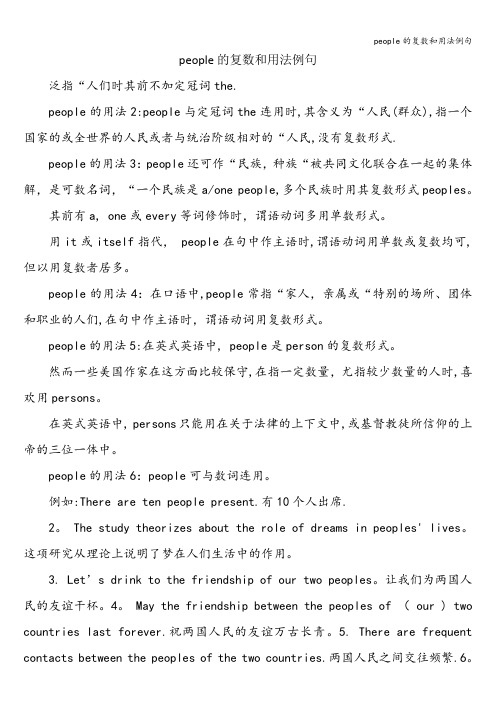
people的复数和用法例句泛指“人们时其前不加定冠词the.people的用法2:people与定冠词the连用时,其含义为“人民(群众),指一个国家的或全世界的人民或者与统治阶级相对的“人民,没有复数形式.people的用法3:people还可作“民族,种族“被共同文化联合在一起的集体解,是可数名词,“一个民族是a/one people,多个民族时用其复数形式peoples。
其前有a, one或every等词修饰时,谓语动词多用单数形式。
用it或itself指代, people在句中作主语时,谓语动词用单数或复数均可,但以用复数者居多。
people的用法4:在口语中,people常指“家人,亲属或“特别的场所、团体和职业的人们,在句中作主语时,谓语动词用复数形式。
people的用法5:在英式英语中, people是person的复数形式。
然而一些美国作家在这方面比较保守,在指一定数量,尤指较少数量的人时,喜欢用persons。
在英式英语中, persons只能用在关于法律的上下文中,或基督教徒所信仰的上帝的三位一体中。
people的用法6:people可与数词连用。
例如:There are ten people present.有10个人出席.2。
The study theorizes about the role of dreams in peoples' lives。
这项研究从理论上说明了梦在人们生活中的作用。
3. Let’s drink to the friendship of our two peoples。
让我们为两国人民的友谊干杯。
4。
May the friendship between the peoples of ( our ) two countries last forever.祝两国人民的友谊万古长青。
5. There are frequent contacts between the peoples of the two countries.两国人民之间交往频繁.6。
people 怎么读
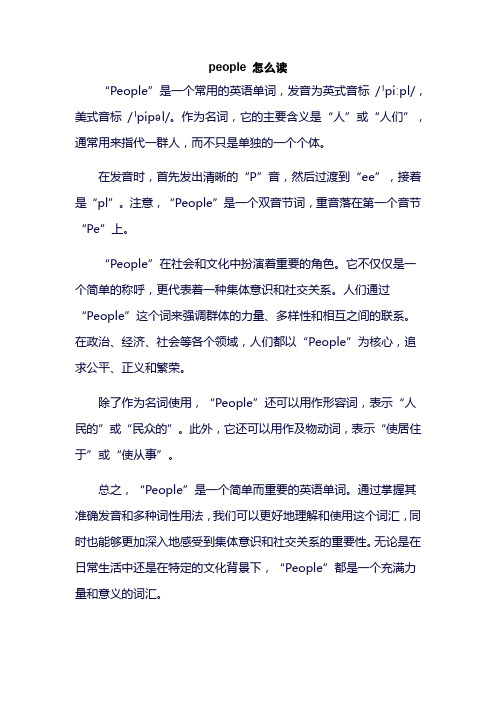
people 怎么读
“People”是一个常用的英语单词,发音为英式音标/ˈpiːpl/,美式音标/ˈpipəl/。
作为名词,它的主要含义是“人”或“人们”,通常用来指代一群人,而不只是单独的一个个体。
在发音时,首先发出清晰的“P”音,然后过渡到“ee”,接着是“pl”。
注意,“People”是一个双音节词,重音落在第一个音节“Pe”上。
“People”在社会和文化中扮演着重要的角色。
它不仅仅是一个简单的称呼,更代表着一种集体意识和社交关系。
人们通过“People”这个词来强调群体的力量、多样性和相互之间的联系。
在政治、经济、社会等各个领域,人们都以“People”为核心,追求公平、正义和繁荣。
除了作为名词使用,“People”还可以用作形容词,表示“人民的”或“民众的”。
此外,它还可以用作及物动词,表示“使居住于”或“使从事”。
总之,“People”是一个简单而重要的英语单词。
通过掌握其准确发音和多种词性用法,我们可以更好地理解和使用这个词汇,同时也能够更加深入地感受到集体意识和社交关系的重要性。
无论是在日常生活中还是在特定的文化背景下,“People”都是一个充满力量和意义的词汇。
- 1、下载文档前请自行甄别文档内容的完整性,平台不提供额外的编辑、内容补充、找答案等附加服务。
- 2、"仅部分预览"的文档,不可在线预览部分如存在完整性等问题,可反馈申请退款(可完整预览的文档不适用该条件!)。
- 3、如文档侵犯您的权益,请联系客服反馈,我们会尽快为您处理(人工客服工作时间:9:00-18:30)。
英语中,people 和person 都有“人”的意思,但它们的用法有一定的区别,今天我们一起来学习一下。
1. people: 表示“人,人们”时,一种集合概念,复数名词。
加上定冠词the 时,意为“人民”;表示“民族、种族”时,有复数形式。
例句1:I think it my duty to serve the people.
我认为为人民服务是我的责任。
例句2:How many people are there in the meeting room?
会议室里有多少人?
例句3:He doesn't care what people think of him.
他不在乎人们怎样看他。
注意,当表达“所有的人”时,不用all people 表示,而是用everyone 或everybody 表达。
2. person:意为“人,个人”,指个体的人,常用于数量不太大且较为精确的场合。
例句4:Who is that person over there?
那边那个人是谁?
例句5:He's a reasonable sort of person.
他是那种通情达理的人。
例句6:This box is very awkward for one person to carry.
这只箱子一个人很不好搬。
